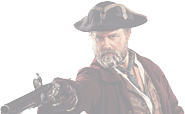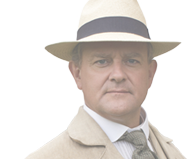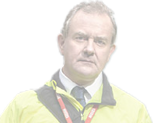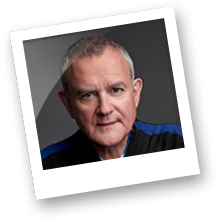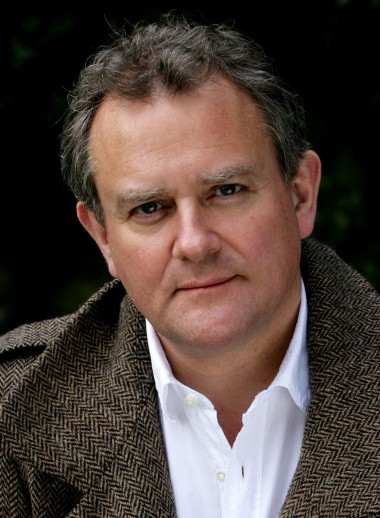Interview by Mark Shenton for The Stage
It is more than eight years since Hugh Bonneville last trod the boards when he appeared in Cloaca, the opening production of Kevin Spacey’s regime at the Old Vic. But this weekend he will once again, for one night only, as he fronts the West End’s biggest annual celebration of its own wares, as co-host of the Olivier Awards.
It is, of course, partly thanks to his increased public profile as Robert, Earl of Grantham, in ITV1’s Downton Abbey that he is doing so – but he is also proud to bang the drum for theatre at a time when it is more necessary than ever, since it is onstage that his own career began and to which he owes his success.
My happiest time on stage was when I was with the RSC as part of a company. I would have been very happy staying there for many years had I been invited to
“At a time when, let’s face it, regional theatres are being shut down, and there’s this big campaign to get audiences to support their local theatres, I think it’s great that ITV are taking the broadcast rights to show them [the Olivier Awards] on TV for the first time in ten years,” says Bonneville, as we chat in his dressing room at Ealing Studios on a lunchtime break from filming the latest series of Downton Abbey.
“The bit we mustn’t forget is that the West End brings in such a vast revenue to the city and boosts the London economy, and the subsidised theatre particularly feeds the commercial sector. There’s no doubt about that – you just have to look at the protagonists of the Olympics opening ceremony, for instance. The people who ran that owe the start of their careers to the subsidised theatres. So the notion of axing the theatre and the creative arts is something we do at our peril. I understand that Germany has in fact boosted its arts funding recently – they fully acknowledge that the arts feed the economy.”
“That’s the flag-waving bit done,” he jokes.
But actually the Olivier Awards presents an opportunity for another bit of flag waving – to promote the theatre as well as show it off.
“Yes, and that’s what ITV has recognised – that it isn’t just a lot of backslapping, but a chance to see all these great West End shows and give a soupcon of what they are about,” says Bonneville. “I think we are seeing excerpts from ten if not more West End musicals. Theatre has been in the shadows since these awards haven’t been televised, so I think it’s great to be able to put it back on the map.”
He’s also delighted to be returning to the theatre briefly, and reveals that he is actively seeking an opportunity for a stage return in the future. “Some people may think I’m just a telly actor, but I spent a lot of my career in the theatre, and I miss it. So this is a great way of dipping my toes back into it, albeit as a bloke in a black tie handing out gongs.”
It wasn’t really a conscious choice to do less theatre: “It’s just that other things took over. Like any actor, you make hay while the sun shines. Work breeds work, and for the last eight years or so I’ve been flat out with TV and bits of film.” But it has also partly been about his family: “I don’t live in London, so the logistics of touring or being in the West End or Stratford are difficult. And with my son growing up, I was in the luxurious position of having TV and film work instead. But I’m really keen to come back and do some theatre, and have been talking to lots of producers about different possibilities. The theatre is definitely on the horizon, but that horizon hasn’t arrived yet.”
He talks fondly of the theatre: “All those old cliches about missing the live sensation of the theatre and the rehearsal room are true. Also in the theatre, the real team work is with the other actors, whereas on a film set the real team work is the crew and the actors dot in and out. All the elements that fuelled me to become an actor and the most enjoyment I get out of being an actor are not so intoxicating on a film set.”
Downton Abbey, he reveals, is a bit different: “We’re a good band on a show like this. My happiest time on stage was when I was with the RSC as part of a company. I would have been very happy staying there for many years had I been invited to. That sense of ensemble is what I love – and it’s why I love Downton so much. It’s an ensemble, and I really thrive on that, as a lot of actors do.”
Of course, Downton also proves how important the British theatre is to such television successes. “It is full of theatre actors like Maggie Smith, Jim Carter, Michelle Dockery, Dan Stevens and Phyllis Logan,” says Bonneville. “They’re all seasoned, terrific actors. Even the younger actors, for whom this is a first or second job, all trained to some degree in theatre and have expectations of doing theatre.”
Whereas professional acting training nowadays is focused much more on providing all-round training to equip students to act both in front of cameras and on the stage, Bonneville had a different experience. “When I did my own brief stint at drama school, we had one afternoon with a Betamax camera, but now filming is taken much more seriously, so they’re in touch with the industry side of things and not just the art of it all,” he says.
But the biggest learning, says Bonneville, comes from working and watching others at work. “There’s a rush into running before you can walk nowadays in all walks of life.
“I know I was a young man in a hurry when I started, too, but I wanted to be as good as I could be. And I realised I had a lot to learn. I was playing walk-on parts and understudying people like Ralph Fiennes as Lysander in A Midsummer Night’s Dream at the Open Air Theatre, Regent’s Park when I started. I also set a huge amount of store by the rep system, that I was at the tail end of, and I got cast to do four or five plays at Colchester’s Mercury Theatre. But I was the only one who was there for the whole season.
“I got to give my Dame in Dick Whittington, I played Petruchio in The Taming of the Shrew, Cliff in Look Back in Anger and Teddy in The Circle. Then I went to the National to hold a spear and really learn by osmosis. Celia Imrie and I were plying flamenco dancers in Yerma, and during the gaps in the play, I would nip up to the Olivier to watch Judi Dench and Anthony Hopkins in Antony and Cleopatra, or Michael Gambon in A Small Family Business or Tons of Money. It was fantastic watching these actors I revered so much. I knew I had a lot to learn, and I still have a lot to learn. Not a day goes by when I don’t learn something new about what we do in this profession.”
Acting for the camera is one thing he’s learnt a lot more about in the last 15 years. “I’m beginning to learn the language of it. I never thought I’d be a camera actor – I felt much more at home on stage. The pressures are very different. You have to keep it bubbling all day for film, and do it from eight different camera angles, rather than in the full flow of a scene onstage.”
He’s also learnt a lot about his own currency as an actor. “I first became aware of the commodity side of things when Notting Hill happened, and suddenly it was a film that lots of people knew about. I was no more or less talented after it opened than two weeks before, but the opportunities to take part in things increased.”
By the same token, he says: “I’m doing a lovely job concurrently with this – a film with George Clooney – that is purely because of the impact of Downton. I have no doubt that the theatre offers that are coming my way now are also based entirely on my marketability.”
And now his marketability and his camera skills are being deployed to celebrate the theatre with this week’s Oliviers. “But I hope I don’t have to talk too much,” he quips.
“I said to the organisers, I want to be more of a maitre d’ who shows you to the table, rather than the annoying waiter who reels off the specials at great length. We’ve got 24 awards to get through so it’s a long evening and we’re going to have to be pretty nippy. So I’m not going to let Sheridan do too much tap dancing.”


